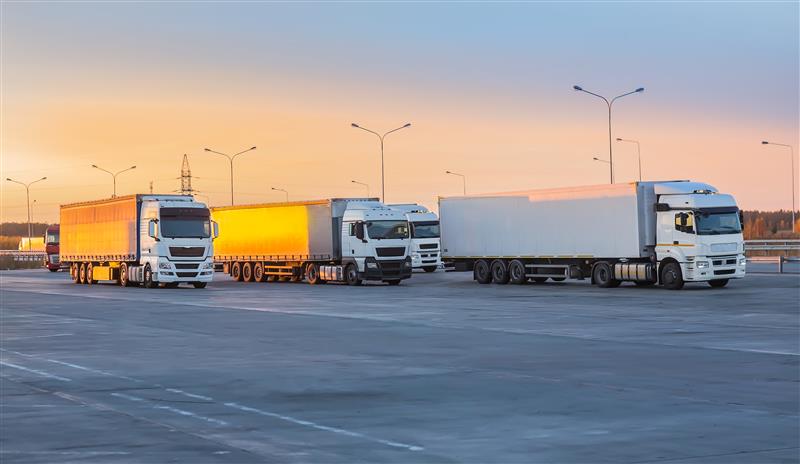
Guest
Mogen vrachtwagens in Europa op zondag rijden?
Gemaakt: 23-12-2024
•
Bijgewerkt: 23-12-2024
Om de rijverboden voor vrachtwagens op zondag in heel Europa te doorstaan, is een grondig begrip nodig van de landspecifieke regelgeving, seizoensgebonden variaties en effectieve strategieën. Door te investeren in een grondige routeplanning, op de hoogte te blijven, de activiteiten te optimaliseren en gebruik te maken van technologie kunnen wagenparkbeheerders de gevolgen van deze beperkingen beperken.
In deze blog onderzoeken we de verschillende regels in verschillende Europese landen en gaan we dieper in op de beste manieren om je daaraan aan te passen.
Land-specifieke regelgeving
Elk land heeft zijn eigen wetten rond rijverboden op zondag en deze kunnen sterk verschillen.
Duitsland
Van 12 uur 's ochtends tot 10 uur 's avonds op de laatste dag van de week mogen vrachtwagens van meer dan 7,5 ton niet rijden. Dit hoeft echter geen afschrikmiddel te zijn. Gecombineerd vervoer kan profiteren van speciale toeslagen, waarbij spoor- en wegvervoer zijn toegestaan binnen 200 kilometer van laad- of losstations en haven- of wegvervoer binnen 150 kilometer van havens. Het vervoer van specifieke bederfelijke goederen is ook vrijgesteld, zoals verse melk, zuivelproducten, vlees, vis, fruit en groenten.
Daarnaast vallen bepaalde voertuigen en activiteiten niet onder het verbod, zoals hulpverleningsvoertuigen die betrokken zijn bij bergings-, sleep- of pechhulpdiensten.
Frankrijk
In dit gebied gelden dezelfde rijbeperkingen als in Duitsland voor vrachtwagens van meer dan 7,5 ton. Deze verboden gelden op zon- en feestdagen van 12.00 tot 22.00 uur.
Bovendien zijn er beperkingen op zaterdagen en de dag voor nationale feestdagen, met een rijverbod van 22.00 tot 12.00 uur. En tijdens de zomer geldt er op bepaalde zaterdagen een rijverbod van 7 uur 's ochtends tot 7 uur 's avonds.
Er bestaan uitzonderingen voor bepaalde goederen, waaronder zuivel- en vleesproducten, en voor hulpverleningsvoertuigen. Overtredingen van deze verboden kunnen leiden tot aanzienlijke boetes, variërend van €750 tot €3.750 voor respectievelijk individuen en bedrijven.
Italië
In Italië mogen vrachtwagens op zon- en feestdagen van 9 tot 22 uur niet op de weg. In juni, juli, augustus en september begint het verbod eerder, om 7 uur 's ochtends, maar het eindigt nog steeds om 22 uur 's avonds.
Het land legt ook extra beperkingen op tijdens de zomermaanden. In juli geldt er op zaterdag een embargo van 8 uur 's ochtends tot 4 uur 's middags en in augustus van 8 uur 's ochtends tot 10 uur 's avonds.
Hoewel dit de algemene regels zijn, is het cruciaal om te weten dat er lokale variaties of tijdelijke beperkingen kunnen zijn op bepaalde routes. Net als in Frankrijk en Duitsland kunnen er ook uitzonderingen gelden voor specifieke soorten goederen of nooddiensten.
Spanje
Spanje is een veel complexer scenario. Er is een lappendeken van regionale verboden, vooral in Catalonië. Rijbeperkingen voor vrachtwagens kunnen veranderen op basis van lokale regelgeving, feestdagen en specifieke routes. Truckers die hier actief zijn, moeten de lokale richtlijnen raadplegen om zeker te zijn dat ze aan de regels voldoen.
Naast de verbodsbepalingen voor zon- en feestdagen zijn er ook beperkingen op bepaalde zaterdagen tijdens de zomermaanden. Deze gelden meestal van 8 uur 's ochtends tot 12 uur 's nachts, vooral in juli en augustus, wanneer het verkeer drukker is vanwege vakantiegangers.
Andere landen
In veel andere Europese landen geldt ook een rijverbod op zondag. Oostenrijk schrijft bijvoorbeeld voor dat vrachtwagens zwaarder dan 7,5 ton op zondag van 12 uur 's ochtends tot 10 uur 's avonds niet op de weg mogen komen. Zwitserland handhaaft iets soortgelijks, waarbij voertuigen zwaarder dan 3,5 ton de hele dag niet mogen rijden.

Strategieën voor wagenparkbeheerders
Om de rijbeperkingen voor vrachtwagens op zondag te doorstaan, is effectieve routeplanning van cruciaal belang. Door gebruik te maken van geavanceerde technologie en strategisch denken kunnen wagenparkbeheerders hun processen optimaliseren.
Gebruik GPS en routeplanningssoftware
Door gebruik te maken van moderne GPS-systemen en [routeplanningsoftware] (https://snapacc.com/newsroom/route-optimisation-with-fleet-management-software-snap-account/) kunnen vloten en hun chauffeurs de meest efficiënte ritten bepalen en gebieden met rijverboden vermijden. Deze tools kunnen real-time updates geven over de toestand van de wegen, zodat vrachtwagenchauffeurs onderweg weloverwogen beslissingen kunnen nemen.
Overweeg alternatieve routes
Een ander idee is om verschillende manieren te verkennen om op de plek in kwestie te komen. Hoewel het verleidelijk kan zijn om de meest directe weg te nemen, kunnen alternatieve routes vaak tijd besparen en mogelijke boetes vermijden. Dergelijke omwegen zijn misschien iets langer, maar kunnen helpen om gebieden met strenge embargo's te omzeilen, waardoor de operaties vlotter verlopen.
Plan voor vertragingen
Gezien de mogelijkheid van tegenslagen veroorzaakt door verkeersopstoppingen of rijbeperkingen, is het ook verstandig voor wagenparkbeheerders om extra tijd in te bouwen in hun planning. Een proactieve aanpak biedt betere kansen om op tijd te leveren, zelfs bij onverwachte uitdagingen.
Blijf op de hoogte
Op de hoogte blijven van regelgeving en real-time verkeersomstandigheden is net zo cruciaal. Daarom is het verstandig om specifieke apps en websites te gebruiken - deze voorzien vrachtwagenchauffeurs van live updates over wegafsluitingen, ongevallen en files, zodat ze hun routes kunnen aanpassen en vertragingen kunnen voorkomen.
Veel transportverenigingen en logistieke dienstverleners bieden abonnementsdiensten aan voor verkeerswaarschuwingen. Door zich aan te melden voor deze meldingen kunnen wagenparkbeheerders informatie ontvangen over wijzigingen in de verkeersregels, zodat ze zich hieraan kunnen houden.
Technologie benutten
Het gebruik van technologie kan de operationele efficiëntie en de naleving van [rijtijdenregeling] verbeteren (https://snapacc.com/newsroom/drivers-working-time-directive-a-guide-for-truck-drivers/).
Met telematicasystemen kunnen wagenparkbeheerders de locatie van voertuigen, het brandstofverbruik en het gedrag van bestuurders in de gaten houden. De gegevens kunnen van onschatbare waarde zijn voor het optimaliseren van routes. Bovendien vereenvoudigt het bijhouden van digitale logboeken het bijhouden van gegevens en dit levert essentiële documentatie op in het geval van een audit.
Technologie om betalingen te vereenvoudigen is net zo belangrijk - en dat is waar SNAP kan helpen.
Aanmelden bij SNAP
Of u nu op zoek bent naar een veilige parkeerplaats, een truckwash of andere diensten voor uw wagenpark, onze oplossingen maken betalen veel gemakkelijker. Kijk vandaag nog wat SNAP u kan bieden.


